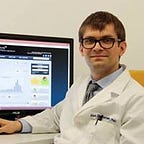Insilico to contribute to Oxford CDT research and educational program in AI
On Monday, February 4th, 2019 the Big Data Institute announced a new doctoral training program:
https://www.bdi.ox.ac.uk/news/bdi-to-host-epsrc-centre-for-doctoral-training-in-health-data-science
Insilico Medicine is happy to contribute to this wonderful initiative. The University of Oxford is considered to be #1 in the world in artificial intelligence and now we know why. They do accept only the best of the best students and focus on academic excellence.
We are happy to follow with a press release of our own.
Thursday, February 7, 2019 — Insilico Medicine, a Rockville-based company developing the end-to-end drug discovery pipeline utilizing the next generation artificial intelligence, announces its partnership with a new Centre for Doctoral Training (CDT) at the University of Oxford, supported by EPSRC (The Engineering and Physical Sciences Research Council).
The goal of the centre is to provide the next generation of doctoral level students with full support, to be able to combat research and innovation challenges across the engineering and physical sciences landscape. The Centre will be located within the Big Data Institute, and will play a leading role in training of health data scientists. The students will be able to complete their doctoral research under the guidance of an academic supervisor and work with a wide range of partner organisations, including Insilico Medicine.
“Insilico Medicine is one of the first AI companies to combine the expertise in artificial intelligence applied to the cutting-edge medicinal chemistry and target identification. Our set of software tools and AI libraries, deep domain expertise in target identification and medicinal chemistry, and focus on aging and age-related diseases will contribute to the educational process of the Centre for Doctoral Training. It is a wonderful initiative that makes the UK more attractive for companies like ours”, — said Alex Zhavoronkov, Ph.D., founder, and CEO of Insilico Medicine, Inc.
“Thanks to the EPSRC and the BDI, we are able to deliver research training at the heart of the University’s medical campus, producing the data scientists we need to help transform health research and healthcare delivery”, — said Jim Davies,the Director of the CDT
The Centre is one of 75 announced on Monday at the London Stock Exchange by UK Research and Innovation.
###
For further information, images or interviews, please contact:
Insilico Medicine Contact: Klug Gehilfe ai@pharma.ai
Website: http://insilico.com/
CDT Contact:
About BDI
The Big Data Institute is located in the Li Ka Shing Centre for Health Informatics and Discovery at the University of Oxford. It is an interdisciplinary research centre that focuses on the analysis of large, complex data sets for research into the causes, consequences, prevention and treatment of disease. Research is conducted in areas such as genomics, population health, infectious disease surveillance and the development of new analytic methods. The Big Data Institute is supported by funding from the Medical Research Council, the UK Research Partnership Investment Fund, the National Institute for Health Research Oxford Biomedical Research Centre, and philanthropic donations from the Li Ka Shing and Robertson Foundations.
Further details are available at http://www.bdi.ox.ac.uk
About EPSRC
The Engineering and Physical Sciences Research Council (EPSRC) is the main funding body for engineering and physical sciences research in the UK. By investing in research and postgraduate training, we are building the knowledge and skills base needed to address the scientific and technological challenges facing the nation.
EPSRC is part of UK Research and Innovation, a new body which works in partnership with universities, research organisations, businesses, charities, and government to create the best possible environment for research and innovation to flourish. We aim to maximise the contribution of each of our component parts, working individually and collectively. We work with our many partners to benefit everyone through knowledge, talent and ideas.
About Insilico Medicine, Inc
Insilico Medicine is an artificial intelligence company headquartered in Rockville, with R&D and management resources in Belgium, Russia, UK, Taiwan, and Korea sourced through hackathons and competitions. The company and its scientists are dedicated to extending human productive longevity and transforming every step of the drug discovery and drug development process through excellence in biomarker discovery, drug development, digital medicine, and aging research.
Insilico pioneered the applications of the generative adversarial networks (GANs) and reinforcement learning for generation of novel molecular structures for the diseases with a known target and with no known targets. In addition to working collaborations with the large pharmaceutical companies, the company is pursuing internal drug discovery programs in cancer, dermatological diseases, fibrosis, Parkinson’s Disease, Alzheimer’s Disease, ALS, diabetes, sarcopenia, and aging. Through a partnership with LifeExtension.com, the company launched a range of nutraceutical products compounded using the advanced bioinformatics techniques and deep learning approaches. It also provides a range of consumer-facing applications including Young.AI.
In 2017, NVIDIA selected Insilico Medicine as one of the Top 5 AI companies in its potential for social impact. In 2018, the company was named one of the global top 100 AI companies by CB Insights. In 2018 it received the Frost & Sullivan 2018 North American Artificial Intelligence for Aging Research and Drug Development Awardaccompanied with the industry brief. Brief company video: https://www.youtube.com/watch?v=l62jlwgL3v8. http://www.insilico.com
